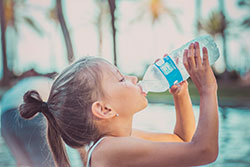With the extreme heat expected to continue, coupled with power outages, the Mifflin Township Division of Fire is offering some tips for residents to stay safe.
- Check on family, friends and neighbors who do not have air conditioning and who spend much of their time alone. If you are concerned about the medical well-being of a resident, contact the non-emergency dispatch at (614) 471-4444.
- Drink plenty of water; even if you do not feel thirsty. Avoid beverages containing alcohol or caffeine. They can add to dehydration and increase the effects of heat illnesses.
- Eat well-balanced, light and regular meals. Avoid using salt tablets unless directed by a physician.
- Dress in loose-fitting, lightweight and light-colored clothes that cover as much skin as possible. Avoid dark colors because they absorb the sun’s rays.
- Protect face and head by wearing a wide-brimmed hat.
- Stay indoors as much as possible and limit exposure to the sun.
- Stay on the lowest floor out of the sunshine if air conditioning is not available.
- Electric fans may help, but they will not prevent heat-related illness if temperatures are in the high 90’s. Take a cool shower or bath or move to an air-conditioned place to cool off.
- Limit outdoor activity to morning and evening. Rest often in shady areas so that your body’s thermostat will have a chance to recover.
- Avoid strenuous work during the warmest part of the day. Use a buddy system when working in extreme heat and take frequent breaks.
- Consider spending the warmest part of the day in public buildings such as libraries, schools, movie theaters, shopping malls and other community facilities. Circulating air can cool the body by increasing the perspiration rate of evaporation.
- Think of your pets too. Provide plenty of fresh water and leave the water in a shady area. Bring your pet indoors where it is cooler. Never leave an animal in the car on hot days.
Signs and Symptoms of Heat-Related Illnesses
Heat-related illnesses such as heat cramps, heat exhaustion and heat stroke can strike at any time. Symptoms include dizziness, nausea, rapid heartbeat, headache, absence of perspiration and dry, hot flushed skin. Anyone experiencing these symptoms should seek immediate medical attention.
https://myfcph.org/resources/heat-safety/
Never leave infants, children or pets in a parked car. Cars can heat up to dangerous temperatures quickly. Even if the windows are cracked open, interior temperatures can rise almost 20 degrees within the first 10 minutes. According to the National Safety Council, since 1998, more than 900 children have died from vehicular heatstroke – an average of 38 per year – and 53 percent of incidents involve a parent or caregiver forgetting the child was in the vehicle. In extreme heat, temperatures inside of vehicles can reach life-threatening levels for both kids and dogs within minutes. A child’s body heat up three to five times faster than an adult body. And, similarly, with a dog, young, overweight or elderly animals, or those with short muzzles or thick or dark-colored coats are most at risk for overheating.
Learn more:
https://www.vets-now.com/summer/dogs-in-hot-cars/
Fumes can kill! Don’t use generators or grills in or near your home or garage when your power is out. Anything that burns fuel produces carbon monoxide gas, and during power outages it becomes more common when people use a generator to supply power or a grill or camp stove to cook food.
https://www.cdc.gov/co/default.htm
Don’t leave unattended candles burning. According to the National Fire Prevention Association, from 2015-2019 U.S. fire departments responded to an estimate 7,400 home structure fires caused by candles per year. These fire cause an annual average of 90 deaths, 670 injuries and $291 million in property damage. Far better to use flashlights when you need a source of light during a power outage.

